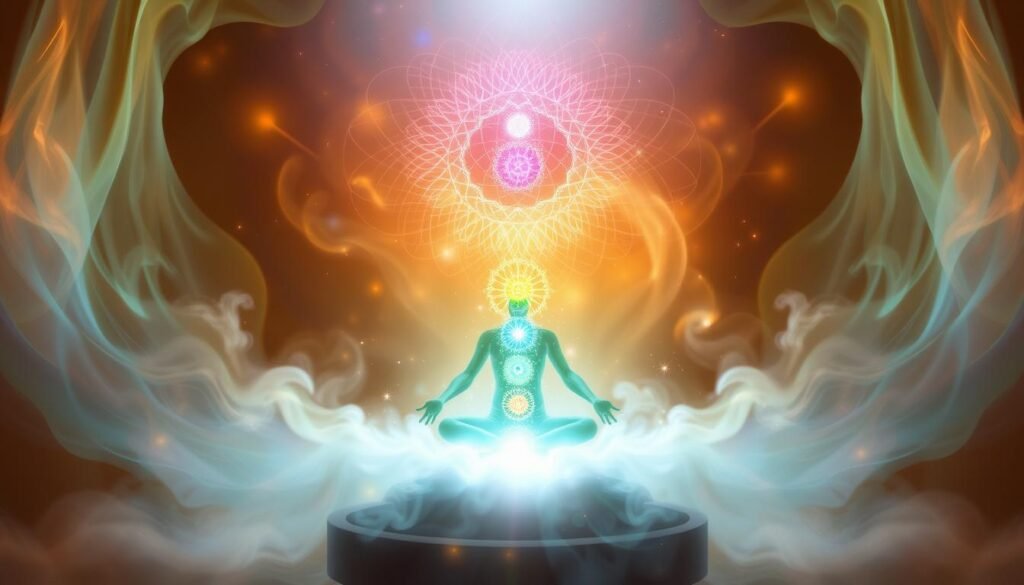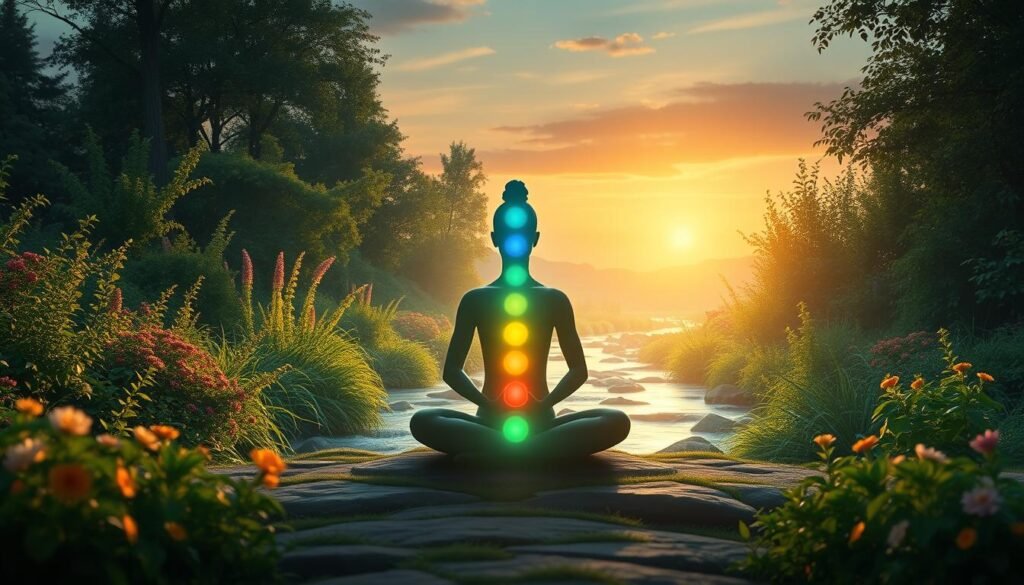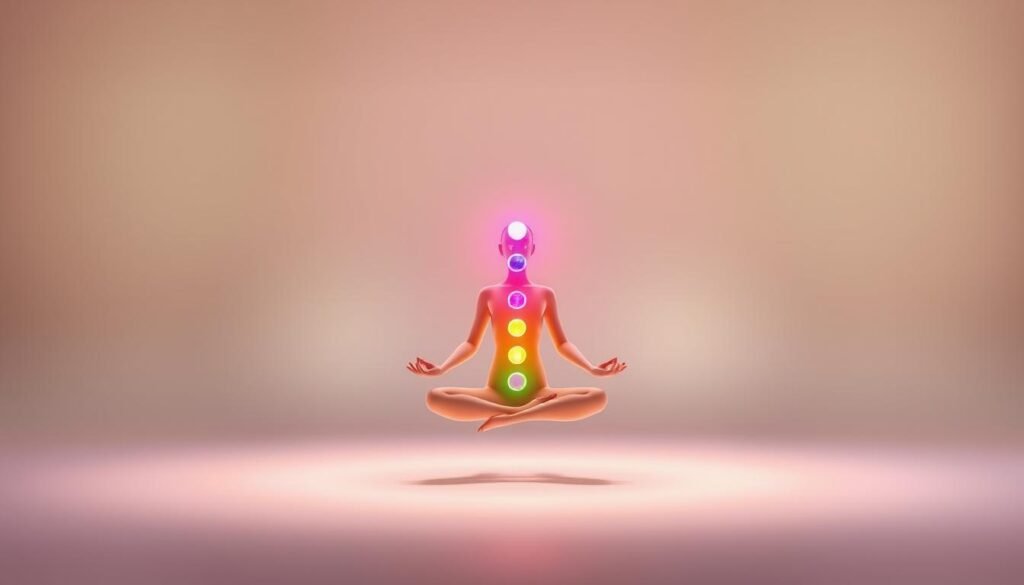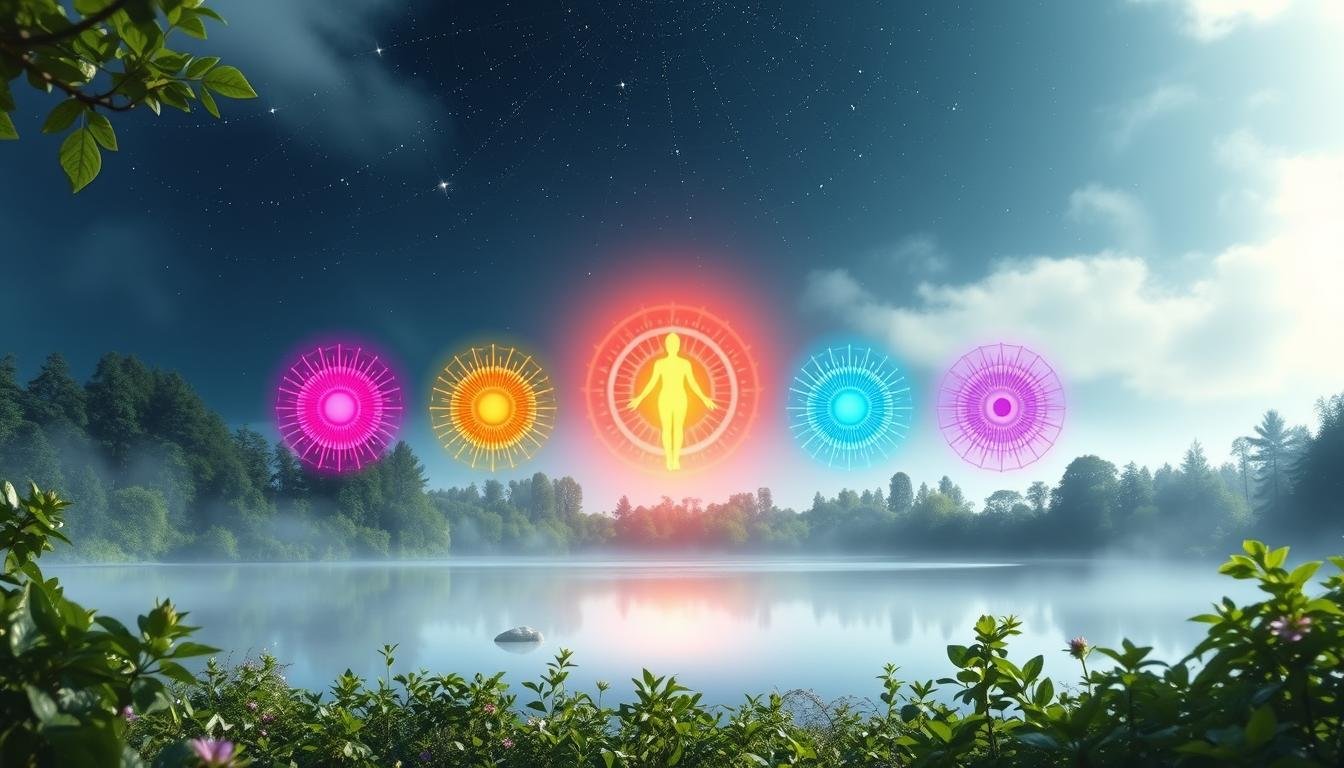I’ve come to realize that our emotional and physical wellbeing is closely linked to the state of our energy centers in the body, known as chakras. According to ancient Eastern traditions, these energy centers play a crucial role in maintaining our overall spiritual health.
When our chakras are balanced, our body and mind function harmoniously. However, when they become blocked or depleted, it can lead to various health issues, including anxiety. By understanding how to balance our chakras, we can potentially alleviate symptoms of anxiety and improve our overall wellbeing.
Key Takeaways
- Understanding the connection between chakras and emotional wellbeing.
- Exploring how chakra imbalances can lead to anxiety symptoms.
- Discovering how balancing chakras can help alleviate anxiety.
- Learning techniques for chakra balancing and healing.
- Integrating chakra balancing into a holistic approach to anxiety management.
Understanding the Connection Between Chakras and Anxiety
To comprehend how chakras influence anxiety, it’s essential to understand the basics of the chakra system and its impact on our overall health. Chakras are energy centers within our body that govern various aspects of our being, from physical health to emotional and spiritual well-being.
What Are Chakras and How Do They Work?
Chakras are subtle energy centers that play a crucial role in our overall health. The term “chakra” refers to the spinning wheels of energy that run along the spine, from the base to the crown of the head. There are seven major chakras, each associated with different emotions, thoughts, and physical aspects. The Root Chakra, or First Chakra, is particularly relevant when discussing anxiety as it relates to feelings of security, survival, and grounding.

How Blocked Chakras Contribute to Anxiety
When energy flow is disrupted or depleted, blockages can occur, leading to various psychological symptoms, including anxiety. The Root Chakra regulates our sense of security and survival instincts. An imbalance here can manifest as anxiety about basic needs and feelings of instability. Similarly, blockages in other chakras, such as the Sacral Chakra (emotional instability), Solar Plexus (personal power), Heart Chakra (relationships and self-worth), Throat Chakra (self-expression), Third Eye, and Crown Chakra (existential and spiritual concerns), can lead to different types of anxiety.
| Chakra | Associated Anxiety |
|---|---|
| Root Chakra | Anxiety about security and survival |
| Sacral Chakra | Emotional instability and relationship anxiety |
| Solar Plexus | Anxiety about personal power and control |
Understanding the connection between chakras and anxiety can provide insights into holistic approaches to managing stress and anxiety, emphasizing the need to address energy imbalances.
The Science Behind Chakra and Anxiety Relief
As we explore the science behind chakra balancing, it becomes clear that its impact on anxiety is multifaceted. The practice involves various techniques, including meditation, yoga, and breathing exercises, which have been studied for their effects on both physical and mental health.
Research on Meditation and Anxiety Reduction
Research has shown that regular mindfulness practice, often used in chakra balancing, significantly reduces symptoms of anxiety and depression. A 2018 review indicated that mindfulness practice alone can lead to substantial reductions in anxiety symptoms. This is supported by studies on meditation, which have found that it can positively impact the body’s stress response system.
Physical and Psychological Benefits of Chakra Balancing
Chakra balancing offers numerous benefits, both physical and psychological. Physically, practices used in chakra balancing can lead to reduced muscle tension, improved sleep quality, and enhanced immune function. Psychologically, chakra work can improve emotional regulation, increase self-awareness, and boost resilience to stress. Techniques such as yoga and breathing exercises directly impact the nervous system, promoting relaxation and reducing anxiety.
- Physical Benefits: Reduced muscle tension, improved sleep, and better immune function.
- Psychological Benefits: Improved emotional regulation, greater self-awareness, and enhanced resilience to stress.
By integrating these practices into daily life, individuals can experience lasting changes in how they respond to stressors, ultimately leading to better management of anxiety. The holistic approach of chakra balancing addresses multiple aspects of wellbeing simultaneously, making it a valuable tool for those seeking to alleviate anxiety.

Step-by-Step Guide to Balancing Your 7 Chakras for Anxiety Relief
Restoring balance to your 7 chakras can be a transformative experience, helping you to overcome anxiety and achieve a more peaceful state of mind. By understanding how to balance your chakras, you can take a holistic approach to managing stress and promoting overall health.
Root Chakra: Grounding Techniques for Security
The Root Chakra is associated with feelings of safety and security. When it’s imbalanced, you may experience feelings of fear or instability.
Signs of Root Chakra Imbalance
Signs of an imbalanced Root Chakra include feelings of insecurity, fear, or instability. You may also experience physical symptoms such as lower back pain or issues with your feet or legs.
Practices to Balance Your Root Chakra
To balance your Root Chakra, try practicing grounding techniques such as meditation, yoga, or deep breathing exercises. You can also use affirmations such as “I am safe and secure” to help calm your mind and body.

Sacral and Solar Plexus Chakras: Emotional Balance and Personal Power
The Sacral and Solar Plexus Chakras are associated with emotional balance and personal power. When they’re imbalanced, you may experience feelings of emotional turmoil or powerlessness.
Addressing Fear and Insecurity
To address fear and insecurity, try practicing self-reflection and journaling. You can also use affirmations such as “I am confident and capable” to help boost your self-esteem.
Exercises for Confidence Building
Exercises such as yoga or tai chi can help you build confidence and improve your overall sense of well-being. You can also try practicing visualization techniques to help you achieve your goals.
Heart and Throat Chakras: Expressing and Processing Emotions
The Heart and Throat Chakras are associated with expressing and processing emotions. When they’re imbalanced, you may experience feelings of emotional numbness or difficulty expressing yourself.
Communication Practices for Anxiety Relief
To alleviate anxiety, try practicing effective communication techniques such as active listening or assertiveness training. You can also use journaling or creative expression to help process your emotions.
Self-Compassion Techniques
Self-compassion techniques such as meditation or deep breathing can help you cultivate a more compassionate and loving attitude towards yourself.
Third Eye and Crown Chakras: Mindfulness and Spiritual Connection
The Third Eye and Crown Chakras are associated with mindfulness and spiritual connection. When they’re imbalanced, you may experience feelings of disconnection or confusion.
Meditation Practices for Higher Awareness
Meditation practices such as mindfulness meditation or transcendental meditation can help you cultivate higher awareness and improve your overall sense of well-being.
Connecting to Inner Wisdom
To connect with your inner wisdom, try practicing introspection and self-reflection. You can also use journaling or creative expression to help tap into your inner guidance.
Daily Chakra Balancing Routine for Anxiety Management
To manage anxiety and promote overall health, try incorporating a daily chakra balancing routine into your life. This can include practices such as meditation, yoga, or deep breathing exercises.
By following this step-by-step guide, you can take a holistic approach to managing anxiety and promoting overall health and well-being.
Conclusion: Integrating Chakra Healing into Your Anxiety Management Plan
As we navigate the complexities of anxiety, exploring the role of chakras in our emotional and spiritual wellbeing can provide valuable insights and practical tools for healing.
By understanding the connection between chakra imbalances and anxiety symptoms, we can utilize chakra healing as a complementary approach to conventional treatments, enhancing our overall health and energy.
To effectively integrate chakra practices into your anxiety management plan, consider combining them with other techniques such as therapy, medication (if prescribed), and lifestyle changes. Consistency and patience are key, as is approaching this practice with an open mind.
By developing awareness of our energy system and taking an active role in managing anxiety, we can foster greater overall wellbeing and self-understanding.

